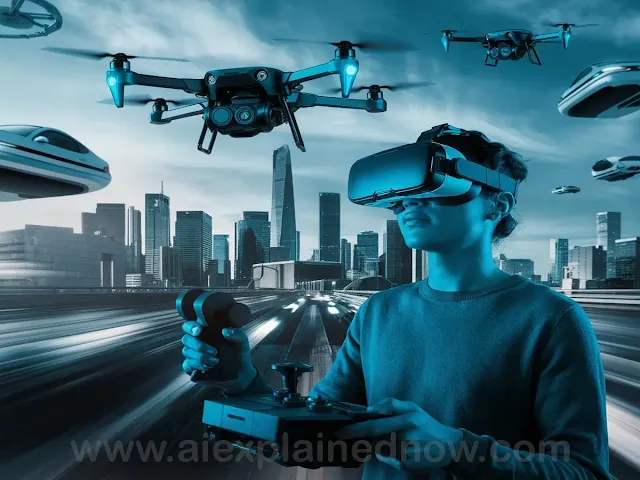AI in Action: The Most Exciting Applications of 2025
 |
| Unveiling the Future: How AI is Shaping 2025's Most Innovative Technologies |
Artificial Intelligence (AI) has been a game-changer across industries for years, but as we step into 2025, its transformative potential is more evident than ever. From healthcare to entertainment, AI continues to revolutionize the way we live, work, and interact. This post explores some of the most exciting applications of AI in 2025, showcasing its profound impact on society and business.
AI in Healthcare: Precision and Accessibility
Healthcare has been at the forefront of AI innovation, and 2025 is no exception. AI-powered tools are reshaping diagnostics, treatment, and patient care, making healthcare more precise and accessible.Advanced Diagnostics
AI algorithms now excel at analyzing medical imaging, identifying diseases like cancer, cardiovascular issues, and neurological disorders with unparalleled accuracy. These systems can process vast amounts of data quickly, enabling early detection and significantly improving patient outcomes.
Personalized Medicine
AI has taken personalized medicine to new heights. By analyzing genetic data, lifestyle choices, and environmental factors, AI systems can craft tailored treatment plans for individuals. This approach not only enhances effectiveness but also reduces adverse reactions.
Telemedicine and Virtual Health Assistants
Telemedicine has expanded significantly, with AI-driven virtual health assistants playing a crucial role. These assistants can provide medical advice, schedule appointments, and even monitor chronic conditions remotely, reducing the burden on healthcare facilities and making care accessible to more people.
AI in Transportation: The Road to Autonomy
The transportation sector has embraced AI to enhance safety, efficiency, and sustainability. 2025 marks a pivotal year for autonomous vehicles and smart transportation systems.Autonomous Vehicles
Self-driving cars are becoming more common, thanks to advancements in AI and sensor technologies. These vehicles rely on AI algorithms to interpret data from cameras, lidar, and radar, ensuring safer navigation. Autonomous taxis and delivery vehicles are revolutionizing urban logistics and commuting.
Smart Traffic Management
AI-powered traffic management systems are reducing congestion and improving road safety. By analyzing real-time traffic data, these systems can optimize signal timings, reroute traffic, and provide instant updates to drivers, saving time and fuel.
Drones and AI-Powered Delivery
Drones equipped with AI are now essential for last-mile delivery in logistics. They can navigate complex urban environments autonomously, delivering packages quickly and efficiently. In rural areas, AI-powered drones are bridging the gap by providing essential supplies like medicine and food.
AI in Education: Personalized and Immersive Learning
Adaptive Learning Platforms
AI-powered platforms assess students' strengths and weaknesses, adapting content to suit their needs. These platforms provide personalized lessons, quizzes, and recommendations, ensuring a more effective learning experience.
Virtual and Augmented Reality in Classrooms
With AI-enhanced virtual and augmented reality (VR/AR), classrooms are becoming immersive spaces. Students can explore historical events, conduct virtual science experiments, or tour distant planets, making learning interactive and memorable.
AI Tutors and Assistants
AI-driven tutors and assistants are now integral to education. They can answer questions, provide feedback, and guide students through complex topics, supplementing traditional teaching methods.AI in Entertainment: Creativity and Immersion
The entertainment industry has embraced AI to push creative boundaries and enhance audience engagement.AI-Generated Content
AI is now a collaborator in content creation, from composing music to writing scripts and generating art. Advanced AI models can mimic human creativity, producing works that resonate with audiences while saving time and resources for creators.
Hyper-Personalized Experiences
Streaming platforms and gaming companies use AI to offer hyper-personalized recommendations and experiences. AI analyzes viewing and playing habits to suggest content tailored to individual preferences, keeping users engaged.
Immersive Gaming with AI NPCs
Non-player characters (NPCs) in video games have become more lifelike, thanks to AI. These NPCs can adapt to player behavior, providing dynamic storylines and challenging gameplay that evolves with each interaction.
AI in Climate Action: A Sustainable Future
AI is playing a crucial role in combating climate change by driving sustainable practices and enabling innovative solutions.Climate Modeling and Prediction
AI systems analyze climate data to predict weather patterns, assess the impact of human activities, and guide policymakers in developing effective strategies to combat climate change.Smart Agriculture
AI-powered tools are helping farmers optimize irrigation, predict crop yields, and monitor soil health. These innovations reduce waste and enhance productivity, contributing to global food security.
Energy Optimization
AI is transforming energy consumption through smart grids and efficient energy management systems. By analyzing usage patterns, AI optimizes energy distribution and reduces waste, supporting renewable energy adoption.
AI in Business: Efficiency and Innovation
Businesses across sectors are leveraging AI to enhance operations, improve customer experiences, and drive innovation.Customer Service Chatbots
AI-driven chatbots are now the first point of contact for customers, providing instant support and resolving queries efficiently. Natural language processing (NLP) advancements make these interactions seamless and human-like.
Predictive Analytics
AI-powered predictive analytics tools help businesses forecast trends, identify opportunities, and mitigate risks. These tools are invaluable for decision-making in areas like marketing, finance, and supply chain management.
Automation and Workforce Augmentation
AI is automating repetitive tasks, freeing up human workers to focus on strategic initiatives. Collaborative AI systems work alongside humans, enhancing productivity and creativity in the workplace.
Conclusion: The Promise of AI in 2025
The applications of AI in 2025 are as diverse as they are impactful. From improving healthcare outcomes to revolutionizing transportation, education, entertainment, climate action, and business, AI continues to shape the future. As we navigate this exciting era, it is essential to balance innovation with ethical considerations, ensuring that AI benefits society as a whole. The possibilities are endless, and 2025 is just the beginning of what AI can achieve.

